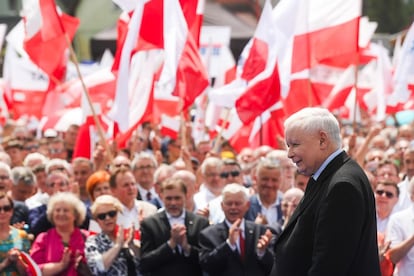Polish government tries to mobilize deeply conservative voters with an anti-immigration referendum
The European Commission’s proposal for the distribution of refugees fuels the ultra-conservative Law and Justice party’s Eurosceptic discourse and calls to defend Polish sovereignty


The impetus that Poland’s ultra-conservative government needed in its campaign for re-election next fall has been unwittingly provided by Brussels. The European Commission’s proposal to close a migration pact by sharing refugees or paying up to €22,000 ($24,033) per refugee that each country refuses to take has served Law and Justice (PiS) and its coalition partners to recover two issues that helped it come to power in 2015 and that mobilize its most conservative base. On the one hand, there is the xenophobic discourse that criminalizes immigration of Muslims by linking it to security concerns, and on the other hand, there is the confrontation with the EU on account of the defense of national sovereignty. To tie both ideas together, Jaroslaw Kaczynski’s party plans to hold a referendum.
Warsaw has already protested vociferously in Brussels and intends to veto the migration proposal. Meanwhile, it has sought to cement its rejection at home with actions that have few repercussions at the European level, but with a national political impact in the election period. The Sejm, the lower house of Parliament, passed a resolution against the system proposed by Brussels on June 15, and from the rostrum that same day, Kaczynski launched the idea of the referendum. “Poles need to speak out on this issue,” he proclaimed.
In the 2015 campaign, when Europe was engulfed in the refugee crisis, mainly from the Syrian war, Kaczynski flagged the rejection of the EU’s proposed quotas and claimed that migrants bring “all kinds of parasites” and “diseases long eradicated in Europe.” In these elections, where security is a central issue, with a war in neighboring Ukraine, the prime minister, Mateusz Morawiecki, justifies his refusal to accept people from outside the country with the argument of “national security.” “Our government is the only guarantor that our borders will remain secure, and that women and children will be able to walk safely at night, not like in other European countries,” he said at the Sejm session on June 15.
Ewa Marciniak, from the Department of Sociology of Politics and Political Marketing at the University of Warsaw, believes that the message this time is heard by a different country, and recalls that there are more than 200,000 people from Asia and the Middle East working in Poland. “They are already part of the Polish landscape in big cities,” she notes. “Where there is almost no direct daily contact with people of other cultures and religions, the rhetoric of threat can be constructed,” she says. However, she adds, “The referendum will be held against the backdrop of that rhetoric of danger.”
Her colleague Maciej Duszczyk, a migration expert at the University of Warsaw, also believes that PiS “is trying to convince Poles that they are under threat.” In the government’s discourse Duszczyk has analyzed, there are migrants who are welcome, such as the more than one million Ukrainians who arrived before the war and the 1.3 million who took refuge in Poland after the invasion, and those who contribute to economic competitiveness. And then there are those who bother: “Those who cross EU borders illegally and can be divided among the Member States.”
The PiS government’s extremely harsh and inflexible response to such immigration is well known to those who have ventured to reach the EU through the Belarusian border. Since 2021 when Aleksandr Lukashenko’s regime began its hybrid attack on EU border countries though the orchestrated people smuggling of thousands of migrants, countless violations of human rights and the international right to asylum have been documented. There have also been dozens of deaths on both sides of the border, which Poland has tried to shield with a security fence. Not even on the most critical occasions, with women and children sheltering in a wooded area in sub-zero temperatures, has the PiS Executive has its arm twisted.
Last Saturday, at a convention of the United Right coalition, which unites PiS with its minority partners, Kaczynski assured his audience that “attacks on the Polish-Belarusian border are starting again.” “We will not let anyone decide for us. That is why the referendum will be called,” he declared. Justice Minister Zbigniew Ziobro, a government partner with the Eurosceptic Sovereign Poland party (even further to the right of PiS), doubled down on the same theme in his speech: “We cannot accept the decisions forced by Chancellor [Olaf] Scholz to relocate tens of thousands of Islamic immigrants to Polish cities without the consent of the residents,” he said, adding the anti-German aspect, which is another recurring element in the government’s narrative.
Duszczyk believes that the government “is using migrants as a tool to attack the EU for mandatory relocation, not so much for the solidarity mechanism.” The opposition meanwhile conveys the message that PiS is overreacting to an invented problem: Poland, they insist, could apply for exemption from the European plan as a country already under pressure from migration. He further estimates that the number of refugees the country would have to take in would be less than 2,000. For the government, however, it is not a question of numbers or exemptions, but of politics. As Aleks Szczerbiak, politics professor and expert on Poland at the University of Sussex, puts it, it’s about “opposing the principle that the EU can decide for itself on migration policy.”
The Brussels proposal suits the ultra-nationalist Polish government as a means to activate the most conservative voters. “It is not an issue that will change things electorally, but we are facing a very close election with little change in the polls, in which mobilizing loyal voters will be key,” the political scientist points out.
Campaign with no punch
PiS continues to lead the polls with an average voting intention of 36%, but without a majority to govern. Their campaign has lost momentum, and although “they should not panic, because they have not lost support,” as Szczerbiak stresses. Kaczynski’s party is seeking to reinvigorate it after seeing the opposition’s momentum, especially the liberal Civic Platform party, with its marches and mass rallies. The ultra-nationalist party has made organizational changes — the party chairman has returned to government as deputy prime minister, and the campaign manager has been changed — as PiS tries to show unity and entrench doorstep concerns such as security, which appeals to more centrist voters, along with others such as immigration and the EU.
Key details about the referendum, such as the questions and the date, have not yet been revealed, but as Szczerbiak points out, the government would like to hold it on the same day as the election to ensure that the issue becomes a central campaign issue. Also to avoid abstention, because to be valid, such a public consultation needs at least 50% participation.
Analysts predict an unpleasant electoral campaign. “It will be negative, even violent,” says Marciniak, who expects to see “malicious smear” campaigns orchestrated against Donald Tusk and other opposition politicians. “Both camps believe that a lot is at stake in these elections,” Szczerbiak notes: “The government thinks that, if it wins, it will be able to finish its reforms and these will have to be accepted by other countries, while the opposition sees that such an outcome could undermine democracy and civil rights.”
Sign up for our weekly newsletter to get more English-language news coverage from EL PAÍS USA Edition
Tu suscripción se está usando en otro dispositivo
¿Quieres añadir otro usuario a tu suscripción?
Si continúas leyendo en este dispositivo, no se podrá leer en el otro.
FlechaTu suscripción se está usando en otro dispositivo y solo puedes acceder a EL PAÍS desde un dispositivo a la vez.
Si quieres compartir tu cuenta, cambia tu suscripción a la modalidad Premium, así podrás añadir otro usuario. Cada uno accederá con su propia cuenta de email, lo que os permitirá personalizar vuestra experiencia en EL PAÍS.
¿Tienes una suscripción de empresa? Accede aquí para contratar más cuentas.
En el caso de no saber quién está usando tu cuenta, te recomendamos cambiar tu contraseña aquí.
Si decides continuar compartiendo tu cuenta, este mensaje se mostrará en tu dispositivo y en el de la otra persona que está usando tu cuenta de forma indefinida, afectando a tu experiencia de lectura. Puedes consultar aquí los términos y condiciones de la suscripción digital.








































